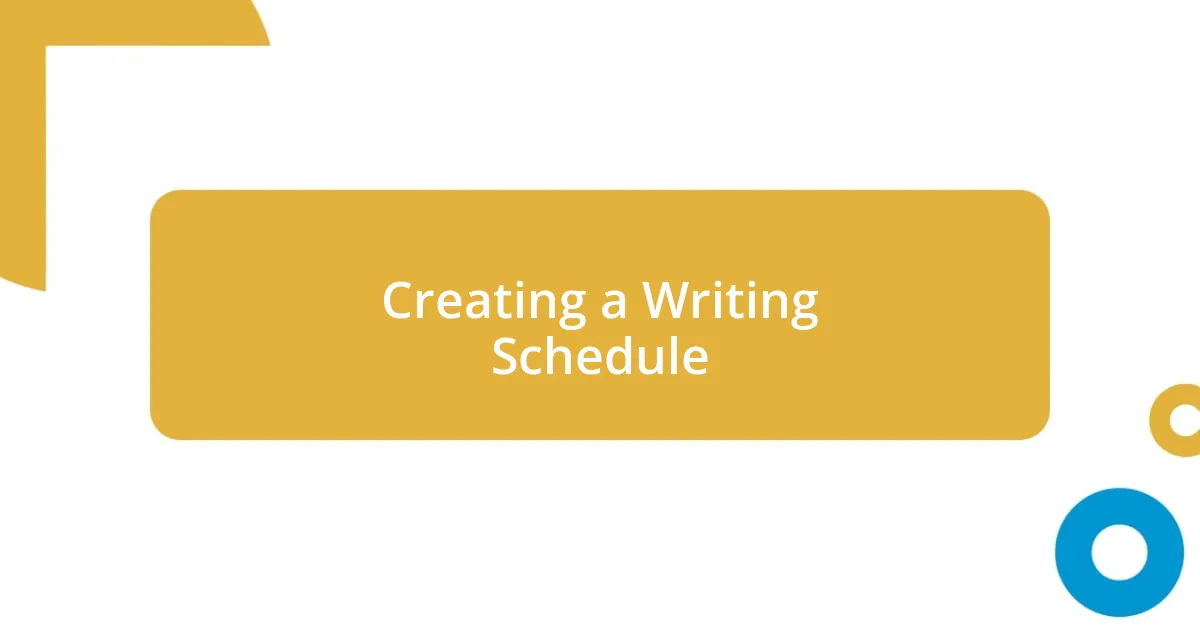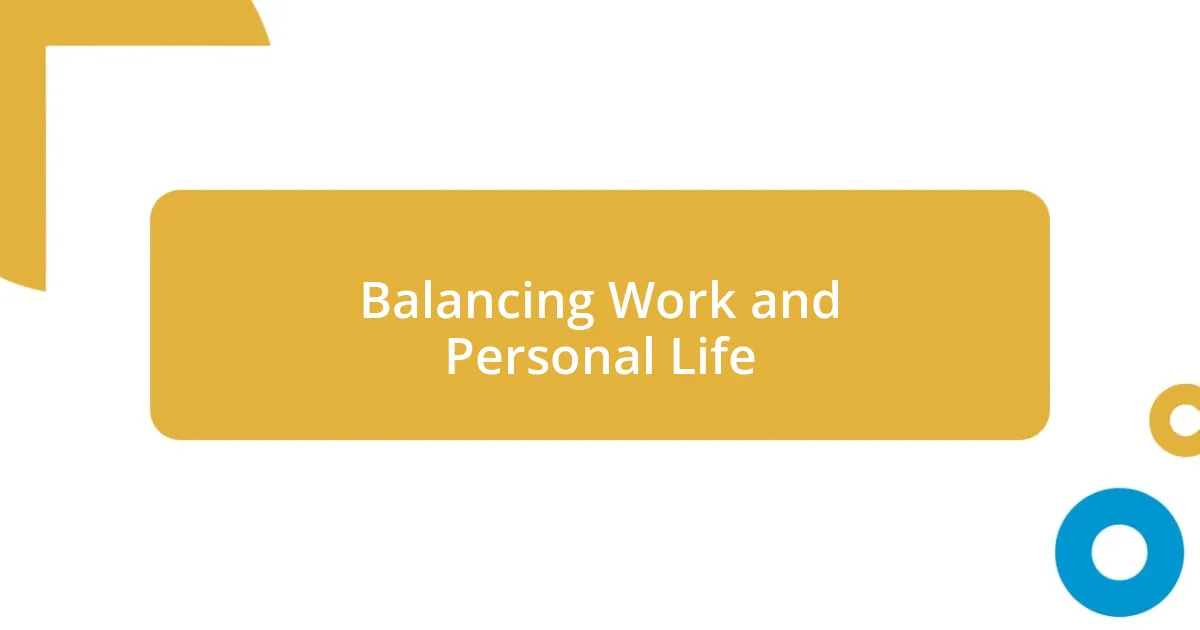Key takeaways:
- Reflecting on your writing purpose can reignite motivation and passion.
- Establishing a consistent writing schedule and treating it as a priority enhances productivity.
- Setting realistic, flexible goals and celebrating small achievements can keep morale high and prevent burnout.
- Utilizing techniques like the Pomodoro method and changing environments can help overcome writer’s block and boost creativity.

Finding Your Writing Motivation
Finding your writing motivation often starts with reflecting on your purpose. I remember sitting at my desk, feeling utterly uninspired, when I asked myself why I wanted to write in the first place. That simple question reignited my passion; I realized I had stories and ideas that I felt compelled to share. How often do we lose sight of our ‘why’ in the everyday hustle?
Another aspect of motivation is making writing a part of your daily routine. I’ve found that writing at the same time each day creates a habit that keeps the creative juices flowing. Initially, it felt forced, but over time, it became a refuge I looked forward to. Isn’t it fascinating how consistency can transform a chore into a cherished ritual?
Moreover, engaging with a community can significantly boost your motivation. I once joined a local writers’ group where sharing and hearing others’ struggles reminded me I wasn’t alone. It’s amazing how much a supportive environment can energize your writing journey. Have you ever felt that electric buzz when sharing your work with others? That sense of connection can be the spark you need to keep going.

Creating a Writing Schedule
Creating a writing schedule has been a game-changer for my productivity. At first, I struggled to carve out time amid daily commitments. However, I decided to treat my writing like an important appointment. Once I began blocking out specific hours each week, I noticed a significant reduction in procrastination. It felt liberating—like I was officially giving myself permission to write without guilt.
To keep myself on track, I developed a simple yet effective writing schedule, which I adapt based on my energy levels and obligations. Here’s what I found helpful:
- Set Specific Times: Choose particular days and times to write, treating these slots as unmissable meetings.
- Prioritize Your Sessions: Mark these writing periods in your calendar to respect your commitment.
- Create a Comfortable Space: Designate a cozy spot where you can focus without distractions.
- Break It Down: Start with smaller time increments, gradually increasing as writing becomes more ingrained in your routine.
- Review and Adjust: Regularly check if your schedule aligns with your life, adjusting as necessary to avoid burnout.
By following these guidelines, I’ve been able to maintain a sustainable balance between writing and the rest of my life. What’s fascinating is how this structure not only boosts my writing but also enriches my overall well-being.

Setting Realistic Writing Goals
Setting realistic writing goals is crucial for maintaining motivation and avoiding burnout. I once set out to write a novel in three months, driven by excitement but ultimately setting myself up for stress. After stumbling through the first draft, I realized that breaking the project into manageable sections would have been far more effective. Goals should be designed to uplift, not overwhelm; when I switched to daily word counts instead, I found that my creativity flourished.
I’ve also learned the importance of being flexible with my writing goals. Last year, I aimed to write a total of 50,000 words in a month for NaNoWriMo but fell short due to unforeseen personal commitments. Rather than viewing this as a failure, I adjusted my goal to focus on writing every day, regardless of the word count. This approach honored my life realities while allowing me to still make progress on my projects without the pressure of rigid deadlines.
In my experience, celebrating small victories is key to sustaining motivation. Each time I hit a milestone—whether it’s completing a chapter or writing for a certain number of days in a row—I take a moment to acknowledge that achievement. This practice not only reinforces my commitment to my writing but also reminds me of the joy in the journey itself. Have you found ways to celebrate your progress, no matter how small?
| Goal Type | Description |
|---|---|
| Daily Word Count | Set a specific number of words to write each day, making it manageable. |
| Weekly Milestones | Break your project into weekly goals to track your overall progress. |
| Flexible Adjustments | Change goals as needed to accommodate life changes and avoid stress. |
| Celebration of Achievements | Acknowledge and reward yourself for completing goals, big or small. |

Balancing Work and Personal Life
Finding the right balance between work and personal life can be a juggling act. I vividly remember a time when my job demands felt like they were swallowing my evenings whole. It was overwhelming, and I often found myself stretching too thin. That experience pushed me to enforce boundaries; now, I make a point to switch off at a specific hour each day. Isn’t it refreshing to reclaim your evenings for personal time? I’ve come to appreciate how crucial this downtime is for my creativity and energy.
I often reflect on how my personal life has the power to enhance my writing. There have been weekends when my family and I embarked on spontaneous adventures, and I noticed how those moments sparked inspiration for my stories. Whether it’s a walk in the park or a cozy night in with a good movie, these simple pleasures invite new ideas and refresh my perspective. Have you ever felt how life experiences breathe new life into your work?
In my journey, I’ve realized that the key to balancing everything isn’t about perfect harmony but rather about adaptability. Life can throw curveballs at any moment. For instance, there was a month where I had to deal with unexpected family matters, which temporarily shifted my focus away from writing. Instead of stressing about lost time, I allowed myself to embrace that time with loved ones, knowing I could always return to my writing later. It’s fascinating how turning challenges into opportunities can lead to richer storytelling down the line.

Strategies for Overcoming Writer’s Block
When writer’s block strikes, I often turn to free-writing as a lifeline. I set a timer for ten minutes and allow my thoughts to flow without any judgment or filtering. This technique has worked wonders for me, as it clears away the cobwebs in my mind and often leads me to unexpected ideas. Have you ever let your thoughts run wild on paper? You might be surprised at what surfaces.
Another method I rely on is changing my environment. I find that a new setting can refresh my perspective and spark creativity. One rainy afternoon, I took my laptop to a café I’d never been to before. The ambiance of clinking cups and quiet chatter helped shift my mindset and ultimately led to some of my best writing that week. Isn’t it interesting how a simple change in scenery can ignite inspiration? I encourage you to explore the spaces around you; your next breakthrough may be just a coffee shop visit away.
In moments when I feel particularly stuck, I also reach out to fellow writers for support. I remember a day when a close friend shared her own struggles with writer’s block during a text conversation. Just voicing my concerns made me realize I wasn’t alone in this battle. Surrounding myself with a supportive community fosters a sense of accountability and encouragement that helps push through those creative barriers. Have you found solace in sharing your writing journey with others? It can be incredibly uplifting to know you’re in this together.

Using Time Management Techniques
One of the techniques that truly transformed my time management was the Pomodoro Technique. I vividly recall my initial skepticism; could working in short bursts really be effective? But I decided to give it a shot. I set a timer for 25 minutes, focused intently on my writing, and took a quick 5-minute break afterward. Suddenly, I felt energized and productive. It’s remarkable how those breaks prevent burnout and give your brain time to recharge. Have you ever noticed how stepping away for just a moment can help clear your mind? It certainly worked wonders for me.
Scheduling my writing sessions in advance has also been a game changer. I now treat these blocks of time like important meetings I can’t skip. One week, I committed to writing every weekday morning before my day job started. It was tough at first, but I quickly discovered that waking up early filled me with a sense of accomplishment before the day even began. I felt like I had carved out a space in my life dedicated solely to my passion. How does making an appointment with your writing influence your mindset?
Lastly, I’ve embraced using digital tools to keep my tasks organized. Apps like Trello or Todoist help me outline my writing goals and daily responsibilities. I remember a particularly chaotic month where I felt lost amid constant demands. Amid the chaos, creating a visual roadmap for my tasks helped clarify my priorities. Decluttering my to-do list not only lessened my anxiety but also made my goals feel more achievable. How do you keep track of your priorities? Finding the right system can make all the difference in maintaining focus and balance.














